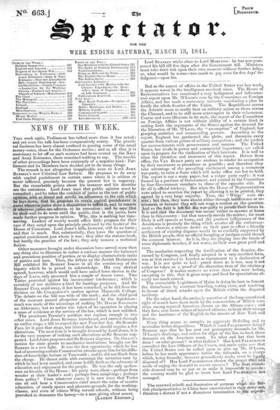NEWS OF THE WEEK.
THIS week again, Parliament has talked more than it has acted ; -and yet even the talk has been comparatively scanty. The practi- cal business has been almost confined to passing some of the usual money-votes, those for the Ordnance service ; and as all that it is customary to let off on such matters had been vented on the Navy and Army Estimates, there remained nothing to say. The results -of other proceedings have been eminently of a negative kind : Par- liament and its Members, have decided not to do many things. The remark is not altogether inapplicable even to Lord JOHN RUSSELL'S new Criminal Law Reform. He proposes to do away with capital punishment in certain cases where it is seldom or -never inflicted, precisely because the present law is nugatory. But the remarkable points about his measure and his doctrine are the omissions. Lord JOHN says that public opinion must be consulted; and he takes the conduct of' juries as the test of public opinion, with so literal and servile an adherence to the rule which he lays down, that he proposes to retain capital Punishment in cases wherever juries show a disposition to inflict it, and to remove it wherever juries are adverse to its execution : and he says that he shall wait to do more until the public, that is the juries, have made further progress in opinion. Why, this is nothing but time- serving. Leaders of society would effect little progress for their race if they acted upon the principle professed by the leader of the House of Commons. Lord JOHN'S bills, however, will do no harm ; and that is much. But, substantially, they leave the question of capital punishment just where it was : they alter the statute-book, but hardly the practice of the law ; they only remove a technical fiction.
Other measures brought under discussion have served more than any thing else to illustrate in rather a curious manner the balanced and precarious position of parties, or to display characteristic traits of parties and men. Thus, the debate on the Jewish Declaration Bill exhibited Sir ROBERT INGLIS in all the consistency of the bigotry which he is proud to acknowledge. His very clerical speech, however, which would well bare suited lawn sleeves in the days of LAUD, only procured him a couple of dozen votes. Two Tories protested against his inconvenient intolerance ; which is certainly of too stubborn a kind for hustings purposes. And Sir ROBERT PEEL staid away, it has been remarked, as he did from the division on Mr. COLQUIIOUN'S motion against Maynooth College. The debate on the bill was wide of the mark ; and the chief good of the measure passed altogether unnoticed by the legislators: much was made of the advantage of making Mr. DAVID SckLomoss an Alderman ; but no notice was taken of its operation in placing a mass of evidence at the service of the law, which is now nullified.
The proximate Premier's position was curious enough in two other cases. Lord Jorni RUSSELL introduced, and carried through an earlier stage, a bill to amend the new Poor-law Act. Sir ROBERT PEEL let it pass that stage, but hinted that he should require a few alterations. The next time it is brought forward by Lord JOHN, it is for the very purpose of making such alterations as Sir ROBERT sug- gested. Lord JOHN proposes and Sir ROBERT disposes. Mr. GILLON'S motion for state grants to mechanics institutions brought out Sir ROBERT in a new light. It was the first opportunity which he has had of answering certain Conservative attacks upon him for his diffu- sion-of-knowledge lecture at Tamworth ; and he did not flinch from the charge. He thrust aside with contempt the sectarian cant by which be had been assailed, and came boldly forth as the advocate of education and enjoyment for the people. He was the only spokes- man on his side of the House : his party were silent—perhaps from wonder at their leader's zeal ; perhaps from misgivings perhaps from policy ? From whatever cause, it is now seen that Tories -can sit and hear a Conservative chief assert the value of secular education, of manly sports and pleasure-grounds for the working- classes, and even of odious Whig normal schools, without being provoked to denounee the heresy—to a man giving silent assent. Lord STANLEY sticks close to Lord MoErETn : he has now post- poned his bill till five days after the Government bill. Ministers must take their risk upon their own measure without further delay, or, what would be worse—too much to pay even for five days' in- dulgence—upon his.


























